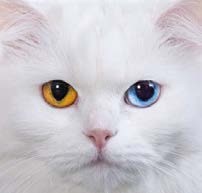Geneticists Enter Feline Territory

By Julianne Glaser
Attempts to unravel the mysteries of temperamental feline personalities and behaviors have challenged cat owners for centuries. The feline genetic paw print has been just as elusive for scientists. Over the past decade geneticists have favored genetic research with dogs over cats, given the similarities between human and canine diseases. But new, exciting research aims to decode the cat genome and identify genetic abnormalities responsible for feline diseases and unique breed traits.
"99 Lives" Initiative Launched Cat Genome Sequencing
In 2007, researchers began to sequence the genome of the first domestic feline subject, an Abyssinian named Cinnamon. In 2014, following data errors and setbacks, scientists published Cinnamon’s full high-resolution genome and determined that house cats remain genetically similar to their wild counterparts despite thousands of years of domestication.
To build on this groundbreaking genetic research, renowned geneticist Leslie Lyons of the University of Missouri launched the “99 Lives” cat genome sequencing initiative. This unique research endeavor aims to demystify the cat genome, improve the quality of previous data, discover genetic mutations that cause inherited diseases and unique phenotypic traits, such as fur or eye color, and shed light on domestic feline evolution. Lyons is eager to see genomic results benefit cats. “I would love to eradicate all genetic disease in cat breeds before we’re done,” she says.
Since the start of the project, Lyons and her colleagues have sequenced the complete genomes of 56 domesticated cats, an undertaking that has cost over $400,000. The “99 Lives” initiative receives funding through a grant from the National Institute of Health and donations from feline breeders and private owners. In addition to studying rare feline diseases, Lyons has also analyzed feline dwarfism and genes related to fur color.
Potential for Human Health
Lyons research has found that feline versions of diseases such as type 2 diabetes, asthma and retinal atrophy have close similarities to these diseases in humans. Cats can also become infected with an HIV-related virus and experience symptoms similar to AIDS patients. Thus, understanding of the cat genome has the potential to not only improve treatment of feline diseases and ailments but translate into improved prevention and intervention for numerous human diseases.
To learn more about the 99 Lives project, visit www.felinegenetics.missouri.edu.
Extension Questions
- Why are wild cats and domestic cats still so genetically similar?
- What other animals’ genetic makeup might offer insight into human health and disease?
